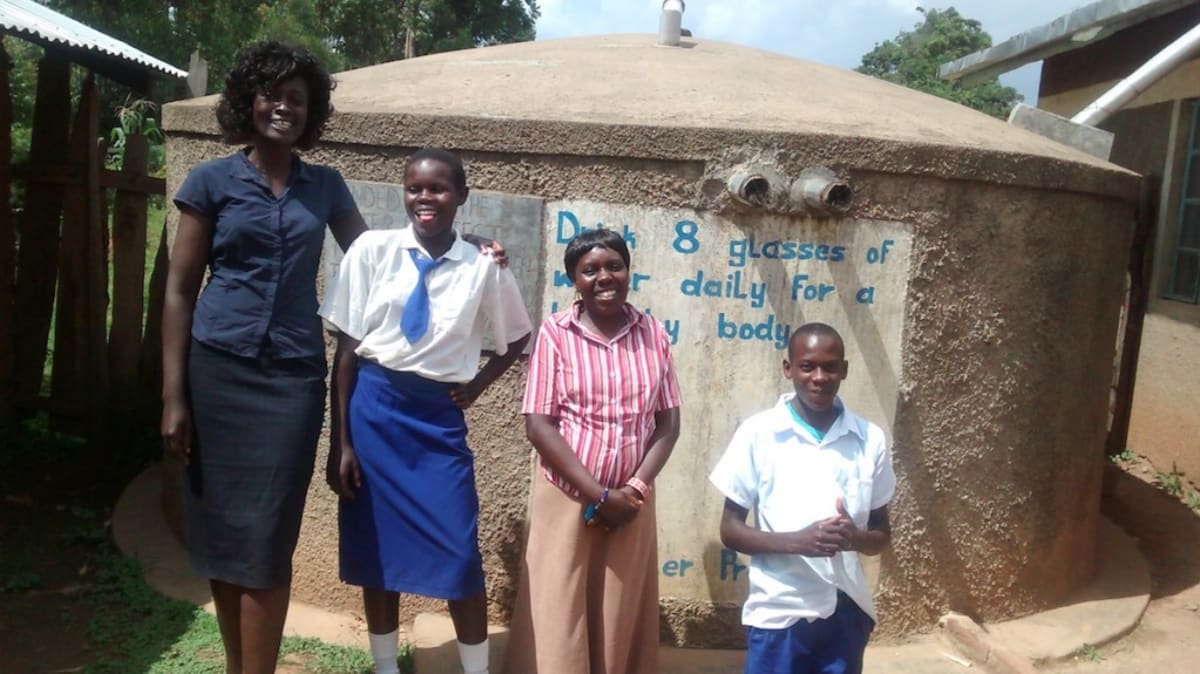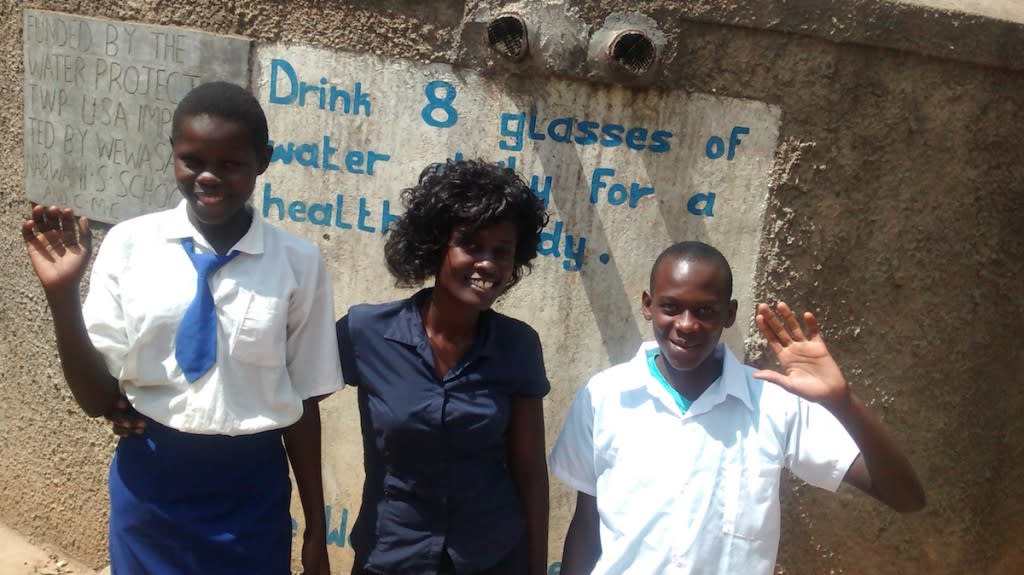This project is a part of our shared program with Western Water And Sanitation Forum. Our team is pleased to directly share the below report (edited for clarity, as needed).
Background Information
Nabwani Secondary School is situated in Nabwani Village, Gaigedi sub-location, Wodanga location in Sabatia sub-county of Vihiga County. The school was started in 2011 as an initiative of the Pentecostal Assemblies of God Church and the Nabwani community members. It is a mixed full day school with a population of 252 students from form two to form four. The form one students did not report in at the time of this survey. Nabwani Secondary School also employs a total of 11 teachers.
The Current Source
The school does not have water or sanitation facilities of their own. The facilities the school uses are either borrowed from the primary section or the neighboring church. These shared facilities include a kitchen, latrines, and a 500-liter plastic water tank that also doubles up as the only hand-washing facility between teachers and students.
To keep the 500-liter tank full, the school groundsman uses a wheelbarrow to constantly fetch water from a spring that is two kilometers away. In some cases, classes have to be interrupted for students to help fetch this water for cooking, cleaning, drinking, and hand-washing purposes. But still, even with a perpetually full tank, this can never be enough water to meet the demands of an ever-growing school population.
Sanitation Situation
Nabwani Primary School only has four VIP latrines for boys while girls have only two that the campus is willing to donate to the female secondary students and staff. "It is an embarrassing situation to share sanitation facilities with students. The situation is worsened when teachers are joined with students in making long queues," said the deputy principal. "Keeping these sanitation facilities clean is still a long-awaited dream because the facilities are still being shared between us and the girls from the primary section. This has made it so hard to hold people responsible for the mess," she added regretfully.
Training Sessions
Parents, students, and staff will be trained for two days on attitudes about hygiene and sanitation and its practices. The training facilitator plans to use PHAST (Participatory Hygiene and Sanitation Transformation), CLTS (Child-Led Total Sanitation), ABCD (Asset-Based Community Development), CTC (Child-to-Child), group discussions, handouts, and demonstrations. CLTS and CTC will be invaluable as they encourage child leaders’ critical role in leading and promoting positive change in their communities. This training will also result in the formation of a CTC club that will be charged with overseeing and maintaining the sanitation facilities on campus.
Building sanitation facilities will boost students' morale and help them work hard. It will also help ease the long waits witnessed when students use latrines during breaks. Besides, hygiene and sanitation trainings will also empower the school community to embrace personal hygiene as well as good environmental hygiene standards. Water availability within their own compound will help the school keep up with their scheduled syllabus and will in turn translate to improved academic performance. "Nabwani Secondary School is desperate for water and the sanitation facilities aid," says the deputy principal, "we are so thankful to The Water Project for having a big heart to consider needy schools like us."
Project Results: Rainwater Catchment Tank
The work team began construction of the 30,000-liter rainwater catchment tank on February 8th. They began by clearing the site. Once clear, they cast and then set the foundation of the tank. After the foundation was given time to harden, the team could then build up the superstructure and wall the tank. The dome was caste and fit, and then the manhole, delivery pipes, inlets, draw pipes, ventilation pipes, and screens were installed. Finally, the drawing point and drainage areas were finished.
With construction of the Nabwani Secondary School thank complete, the institution is now waiting for rains to come and provide them with safe water. Students have a water point that is safe and free from contamination, as opposed to the previous situation when students would wake up very early in the morning in order to fetch water from an unprotected spring 1.5 kilometers away from the school. Cases of absenteeism are expected to decrease as do the incidences of waterborne diseases.
VIP Latrines
Construction of two triple-door VIP latrines is complete and are now being used by students. Students no longer have to share latrines with the primary school section, and so it is now much easier to maintain an acceptable level of hygiene. The time that was initially wasted in line for the primary school latrines is now utilized for studies; the deputy principal is certain that this will result in much better academic performance.
Training
Training was held in one of the school's classrooms, and drew together parents, students, and their teachers. There was a total of 15 participants, of which included nine students planning to form the school's CTC club.
The facilitator used demonstrations, walks around the school campus, group discussions, and presentations to teach the group about the following topics:
- Resource mobilization
- Community participation
- Primary healthcare
- Forming a CTC club
- Children's rights
- Fundraisers
- Hand-washing
- Waterborne diseases and their prevention
- Promoting good health
- Project maintenance
The elected CTC president, female student Mwinyi Ali said, "Initially we did no give much effort to hand-washing procedures, but now we have learned the importance of hand-washing and the percentage reduction of diarrhea incidences attributed to hand-washing using clean water and soap. This is a great milestone for us!" This is a clear indication that the CTC training had a great impact on the entire school community and the neighborhood: The CTC club is active and has already recruited more members to spearhead maintenance and promote high sanitation and hygiene standards. The club meets once a week and cleans sanitation facilities and fills hand-washing stations with water on a daily basis.
The hand-washing facilities are yet to be delivered to the school. However, the students are using temporary stations constructed by the CTC club for washing purposes.

 Rainwater Catchment
Rainwater Catchment
 Rehabilitation Project
Rehabilitation Project

























